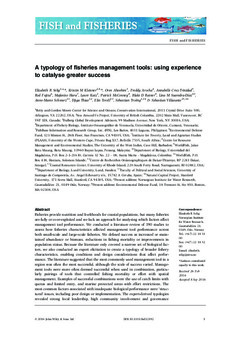A typology of fisheries management tools: using experience to catalyse greater success
Abstract
Fisheries provide nutrition and livelihoods for coastal populations, but many fisheries are fully or over-exploited and we lack an approach for analysing which factors affect management tool performance. We conducted a literature review of 390 studies to assess how fisheries characteristics affected management tool performance across both small-scale and large-scale fisheries. We defined success as increased or maintained abundance or biomass, reductions in fishing mortality or improvements in population status. Because the literature only covered a narrow set of biological factors, we also conducted an expert elicitation to create a typology of broader fishery characteristics, enabling conditions and design considerations that affect performance. The literature suggested that the most commonly used management tool in a region was often the most successful, although the scale of success varied. Management tools were more often deemed successful when used in combination, particularly pairings of tools that controlled fishing mortality or effort with spatial management

